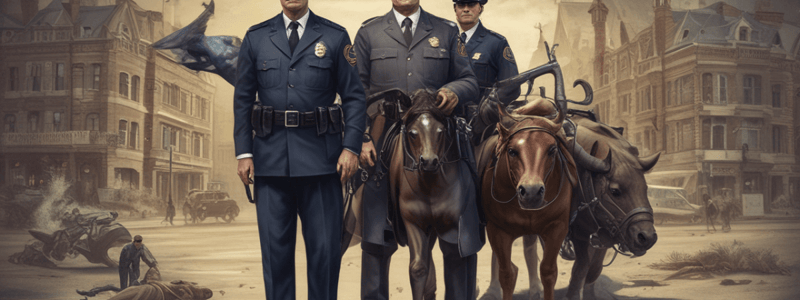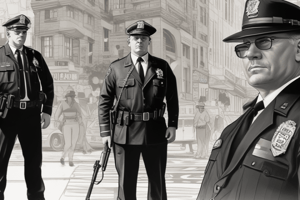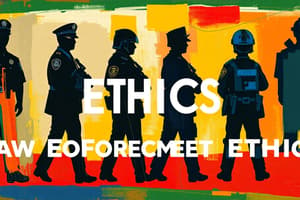Podcast
Questions and Answers
What are the main objectives of the Ethics and Professionalism course?
What are the main objectives of the Ethics and Professionalism course?
- To preach to law enforcement officers
- To discuss the importance of bribery and extortion
- To introduce the concept of sexual harassment
- To provide alternatives in moral decisions affecting law enforcement officers' lives and careers (correct)
How many sources of ethics are identified in the course?
How many sources of ethics are identified in the course?
- Seven
- Six (correct)
- Five
- Three
What are the 'P's of ethical power?
What are the 'P's of ethical power?
- Promotion, Pension, Perks, Power, and Privilege
- Police, Performance, Punishment, Politics, and Power
- Power, Position, Protection, Pay, and Privilege
- Power, Position, Privilege, Prestige, and Pride (correct)
What is the acronym 'A.C.T.' an abbreviation for?
What is the acronym 'A.C.T.' an abbreviation for?
What is the main difference between 'grass eaters' and 'meat eaters'?
What is the main difference between 'grass eaters' and 'meat eaters'?
What is the main objective of the debate regarding gratuities?
What is the main objective of the debate regarding gratuities?
What are the three classifications of corrupt departments according to Sherman?
What are the three classifications of corrupt departments according to Sherman?
What is the purpose of the ethics check questions?
What is the purpose of the ethics check questions?
Under common law, what was the punishment for felonies?
Under common law, what was the punishment for felonies?
According to the Supreme Court Rule, when can officers use deadly force?
According to the Supreme Court Rule, when can officers use deadly force?
What is the purpose of identifying alternatives in a situation?
What is the purpose of identifying alternatives in a situation?
Who are stakeholders in a situation?
Who are stakeholders in a situation?
What is one of the three ethics check questions?
What is one of the three ethics check questions?
What is the purpose of the 'Bell' in ethical decision-making?
What is the purpose of the 'Bell' in ethical decision-making?
What is an example of the 'Denial of responsibility' excuse?
What is an example of the 'Denial of responsibility' excuse?
What is one of the five 'P's of ethical power?
What is one of the five 'P's of ethical power?
What is the 'Theory of relative filth'?
What is the 'Theory of relative filth'?
What is the purpose of the 'Candle' in ethical decision-making?
What is the purpose of the 'Candle' in ethical decision-making?
What is one reason why police agencies are becoming less tolerant of officer-misbehavior?
What is one reason why police agencies are becoming less tolerant of officer-misbehavior?
What happens to the community's perception of a police department when corrupt officers are not disciplined?
What happens to the community's perception of a police department when corrupt officers are not disciplined?
What is one consequence of a corrupt officer's behavior on their colleagues?
What is one consequence of a corrupt officer's behavior on their colleagues?
What is one way that a corrupt officer's behavior can affect their own life?
What is one way that a corrupt officer's behavior can affect their own life?
What is one reason why an officer's personal integrity is important?
What is one reason why an officer's personal integrity is important?
What is the primary purpose of an agency's policy?
What is the primary purpose of an agency's policy?
What is the main difference between a professional code of ethics and social norms?
What is the main difference between a professional code of ethics and social norms?
What is ethics, according to one definition?
What is ethics, according to one definition?
What is one consequence of an officer's corrupt behavior on the media?
What is one consequence of an officer's corrupt behavior on the media?
What is the primary role of an FTO (Field Training Officer) in shaping the 'norm'?
What is the primary role of an FTO (Field Training Officer) in shaping the 'norm'?
What is the main difference between bribery and extortion?
What is the main difference between bribery and extortion?
What is one source of ethics, according to the 3rd edition of 'Policing in America'?
What is one source of ethics, according to the 3rd edition of 'Policing in America'?
What is one way that an officer's integrity can be measured?
What is one way that an officer's integrity can be measured?
What are the 'six pillars of character'?
What are the 'six pillars of character'?
Why is it important for officers to have a set of values and principles?
Why is it important for officers to have a set of values and principles?
What is the main difference between 'grass eaters' and 'meat eaters'?
What is the main difference between 'grass eaters' and 'meat eaters'?
What is quid pro quo in the context of sexual harassment?
What is quid pro quo in the context of sexual harassment?
What is the primary purpose of the 'five standards of ethical policing'?
What is the primary purpose of the 'five standards of ethical policing'?
What is the significance of the 'Tennessee v. Garner' case?
What is the significance of the 'Tennessee v. Garner' case?
What is the main purpose of regulating gratuities?
What is the main purpose of regulating gratuities?
Flashcards are hidden until you start studying
Study Notes
Ethics and Professionalism in Law Enforcement
Importance of Ethics and Professionalism
- Seven justifications for attending this program:
- Career Survival: Police agencies are becoming less tolerant of officer misbehavior and take steps to remove problem officers.
- Career Development: As an officer progresses through the ranks, their span of contacts opens up.
- Media Coverage: The news media watches officers' actions, and is quick to report missteps taken by a police officer.
- Community Perception: The community perceives the department as only as effective as the community perceives it to be.
- Intra-departmental Dissension: The majority of police officers tend to look down on those few who have chosen to fall to the temptation of corruption.
- Officer Survival: Corrupt officers find their job more difficult due to lack of trust and may result in serious injury or loss of life.
- Personal Integrity: Depending on the officer's involvement in corruption, there is usually a strong sense of guilt.
Defining Ethics
- Ethics is a code of values that guides choices and actions, determining the purpose and course of our lives.
- Ethics is not a written code, but it's about what we do.
- Ethics has also been described as a core set of beliefs or values, or standards.
Sources of Ethics
- The six sources of ethics are:
- Justice
- Law
- Agency Policy
- Professional Code of Ethics
- Social Norms
- Personal Values
Pillars of Character
- The six pillars of character are:
- Trustworthiness
- Respect
- Responsibility
- Justice and Fairness
- Caring
- Civic Virtue and Citizenship
Standards of Ethical Policing
- The five standards of ethical policing are:
- Fair Access
- Public Trust
- Safety and Security
- Teamwork
- Objectivity
Bribery and Extortion
- Bribery: When police officers are offered something of value to influence their performance of a duty.
- Extortion: When the officer initiates the agreement, by requiring a person to give him/her something of value in return for some performance (or lack of performance) by the officer.
Corruption Classification
- According to Sherman, there are three classifications of corrupt departments:
- Type I: "Rotten Apples & Rotten Pockets" - Individual officers who use their position for personal gain.
- Type II: "Pervasive Unorganized Corruption" - The organization does not control individual corrupt officers.
- Type III: "Pervasive Organized Corruption" - There are bad officers acting in an organized manner, and the police administration either actively participates or assists passively.
Gratuities and Sexual Harassment
- Gratuities: The arguments for and against accepting gratuities, including abuse of police authority, expression of appreciation, attempt to corrupt officers, goodwill, and social resource.
- Sexual Harassment: Two main forms - quid pro quo and hostile work environment.
Ethics in Decision-Making
- The three ethics check questions:
- Is it legal?
- Is it balanced?
- How will I feel about myself?
- The three "ethical choice strategies":
- The Bell - Do any "bells" or "warning buzzers" go off as I consider my alternatives?
- The Book - Do any of my alternatives violate any laws, policies, rules, Commandments, etc.?
- The Candle - How will my decision stand "the light of day" or the spotlight of publicity?
- The five "P's" of ethical power:
- Purpose
- Pride
- Patience
- Persistence
- Perspective
Studying That Suits You
Use AI to generate personalized quizzes and flashcards to suit your learning preferences.




